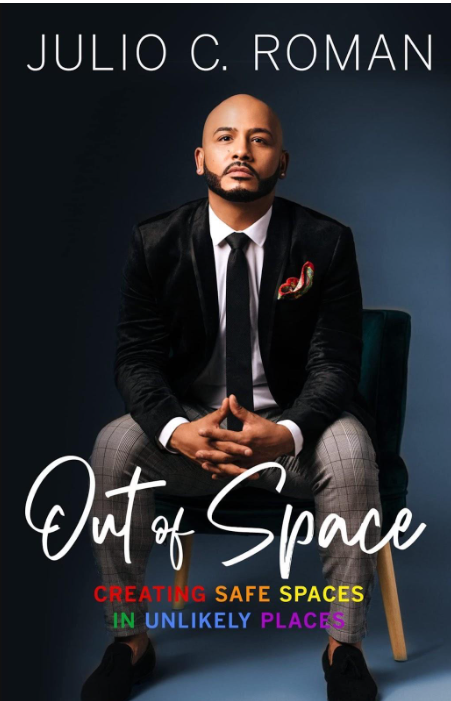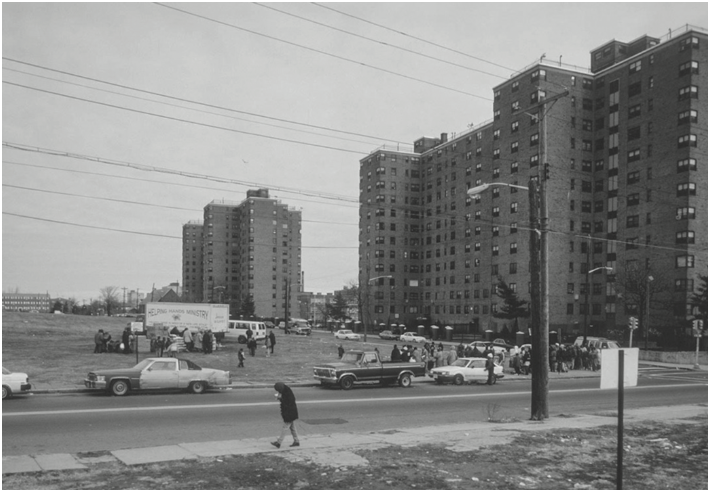Book Review| A Memoir: Claiming Space
NEWARK, NJ—Julio C. Roman grew up in Newark’s Stella Wright housing development in the 1990s—a period underscored by the infiltration of drugs and guns, gang violence, and the HIV/AIDS epidemic with its homophobic assault. Feeling alone, misunderstood, and fearful of the hate crimes so frequently aimed at himself and other gay young people, Roman sought to create a community of love, safety, and understanding in an often-unloving world.
Roman is the founder and Chief Executive of OUT Agency and is now an author with his debut book, Out of Space — Creating Safe Spaces In Unlikely Places. Released on May 17, it is a memoir that shares the intimate details of his upbringing, journey to advocacy and leadership, and the importance of creating safe spaces for marginalized groups. Roman spent the last 22 years creating safe spaces for people isolated because of their LGBTQIA+ identity, race, ethnicity, gender, or faith practices.
A safe space is a place or environment where a person or category can feel confident that they will not experience discrimination, criticism, harassment, or other emotional or physical harm.
Roman uses the contemporary political and social challenges for the LGBTQIA+ community as an entry point to share his leadership framework and strategies he has developed in his long career. Countless stories bring the reader into his world to relive those challenges and the revelations and transformations he experienced growing up.
Stella Wright's housing projects, seen from 18th ave and Prince St., Newark, NJ (1998). Credit: Camilo José Vergara.
Roman's queerness framed him as an outsider in his social environment. Although he tried his best to conceal this identity, he struggled. One experience that resonated with me was Roman's acknowledgement of how his voice, speech, and ideas conveyed gayness to children. His storytelling is an illustration of this realization.
“Kids at my school used that word (f** ) a lot when addressing the more feminine or ‘proper-acting’ boys. I was quiet and had the tendency to be more open or loose only if I got too comfortable with someone, so I never let myself get too comfortable with anyone. I learned to be invisible, to pass as one of them, by burying my voice, laughing, and doing what other kids do to try to fit in” he writes.
Reading this anecdote brought me back to moments of my childhood when other kids would call me gay simply for speaking "proper English". Over time, this experience can pressure queer youth to develop an exterior persona that buries our queerness—" code-switching." This coping mechanism, also known as straight-passing, operates as a shield to protect queer youth from being targeted by bullying and the like. Reading it made me feel like I was right there with Roman, conversing with him as he made this discovery.
Yet, as tiring as this may seem, it is a far more exhausting struggle to reconcile your queerness with God. The confusion, fearful isolation, and supposed solutions or cures (such as praying) make reconciling faith and queerness so monumental: Roman details his experience with all three.
“I prayed about it, I questioned God, begging Him to explain how it was even possible that He could use me to lay hands, preach, or teach. If I was sinning and an abomination, how could the church use me? It made me question at times whether I was hearing from God, or if He could even hear me” he writes.
The most challenging part of this process, Roman describes, is reconciling acceptance of gayness with faith. This framing can lead queer youth to believe that they are inferior even in the presence of God, which can create intense feelings of self-hate. You either believe that queerness is a sin and live in denial, remain in secret, abandon faith, or believe that God loves you just as you are and that there is nothing sinful about being queer. Roman does an exceptional job of not only taking the reader along this journey but also of reliving and explaining the events and circumstances of his struggle. His insight on this particular crisis is invaluable because it displays how to successfully navigate this difficulty in a way that allows for healing, maturity, and wisdom.
Although Roman spent much of his youth battling discomfort and feelings of hatred, he was showered in love by his family. His maternal grandmother Virginia, in particular, always created a reliable sense of security, safety, and love that is felt by the reader during their mentioned moments together. Working as an Avon sales representative, she allowed Roman to browse through new catalogs and would often buy him lip balms, body mists, and scented lotions of his choice. During one of their bonding experiences in her car, Virginia randomly said, “I don’t care if I ever have a grandchild who is different. I’m always going to accept them and love them.”
Roman's portrayal of this scene alone made me feel like I was in the car with them. Instances like these are essential to recognize because they represent the only safe space that Roman knew as a child. And it is these exact feelings of love, comfort, and security that Roman seeks to emulate in the safe spaces he creates. His unique storytelling style allows the reader to experience his safe space and how finite and precious they are. Roman illustrates why more safe spaces are needed by bringing the reader through these memories. This layout creates a synergetic flow that allows the reader to interpret the book's core values and lessons.
Grandma Virginia and Julio in Newark (1998)
While Roman utilizes a storytelling approach to relay the lessons he’s learned and the ways they cultivated his advocacy mindset, Roman goes a step further and dedicates half of his book to instruction and guidance on being an effective leader. While helpful, the book’s transition from Roman’s life journey to his teaching on guidance is a bit abrupt. He shifts from stories on his childhood, moving out, working, and relationships with men to advice, instruction, and questionnaire templates to gather information from large audiences for professional growth without a clear transition. The sharp change leaves the reader with more questions than answers.
Roman’s narrative offers great insight and wisdom, especially for me. Being a relatively young queer man, I could draw on Roman’s experiences and apply them to areas of my life. The power of his storytelling lies not only in how relatable and teachable it is but also in his ability to connect the reader with a depth of empathy and love that makes the book enormously engaging and humbling.



